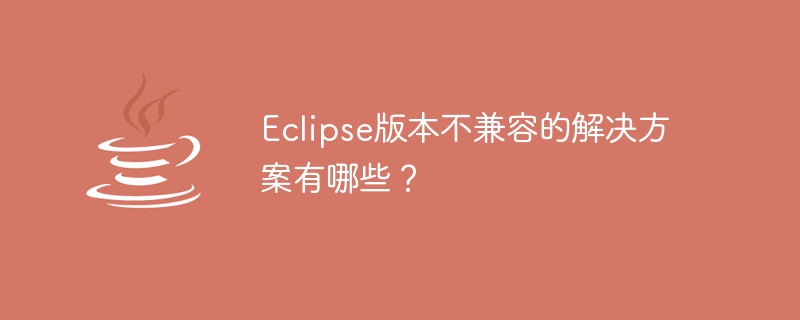

What are the solutions for Eclipse version incompatibility?
With the continuous updating and development of the Java development tool Eclipse, users may encounter Eclipse version incompatibility issues. These problems may be caused by using different Eclipse versions or dependent library versions. In order to solve these problems, some solutions will be introduced below and specific code examples will be provided.
<dependencies>
<dependency>
<groupId>org.eclipse.swt</groupId>
<artifactId>org.eclipse.swt.win32.win32.x86_64</artifactId>
<version>4.20</version>
</dependency>
</dependencies>In the above code example, we use Maven to manage the dependency library and specify the version of org.eclipse.swt as 4.20. At this time, if you switch to a different version of Eclipse, you only need to update the corresponding dependent library version to solve the compatibility problem.
1) Click File > Import in the Eclipse menu;
2) Select General > Existing Projects in the pop-up dialog box into Workspace;
3) Click Next, and then select the folder where the old version of the project is located;
4) Click Finish and wait for the import to complete.
Through the above steps, we successfully imported the old version project into the latest Eclipse, and can debug and develop in the new version.
To sum up, there are many ways to solve the problem of Eclipse version incompatibility. Among them, it mainly includes updating the Eclipse version, checking the dependent library version, updating the Java version and importing old version projects, etc. By rationally using these methods, we can effectively solve the problem of Eclipse version incompatibility and improve development efficiency and quality.
Despite these solutions, developers also need to keep an eye on the latest Eclipse version and changes in the Java development tool chain, and update their development environment in a timely manner to maintain compatibility and enjoy the latest features and Improve.
(The above article is generated by virtual AI and is for reference only.)
The above is the detailed content of How to solve the problem of Eclipse version incompatibility?. For more information, please follow other related articles on the PHP Chinese website!
 eclipse tutorial
eclipse tutorial
 How to set Chinese in eclipse
How to set Chinese in eclipse
 What are the C language programming software?
What are the C language programming software?
 What are the differences between Eclipse version numbers?
What are the differences between Eclipse version numbers?
 What is the difference between eclipse and idea?
What is the difference between eclipse and idea?
 How to create a soft link
How to create a soft link
 Computer cannot copy and paste
Computer cannot copy and paste
 How to solve the problem that css cannot be loaded
How to solve the problem that css cannot be loaded




